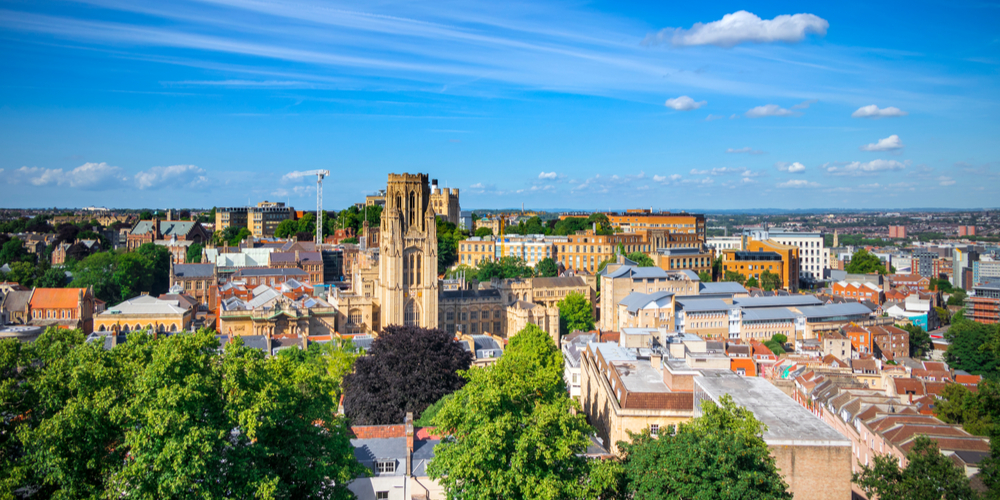
The University of Bristol’s School of Medicine and Dental School are leaders in their field. The combination of quality education and a vibrant city setting makes the university an excellent choice for students.
Undergraduate Medicine Courses
The University’s School of Medicine offers three options for the undergraduate MB ChB degree: a standard 5-year programme, a fast-track 4-year programme for students with previous degrees in certain sciences, and a 6-year programme with a premedical foundation year for students who have not previously studied the sciences.
The MB ChB degree programme examines the social roles of medicine as well as technical and disciplinary knowledge by focusing on the five themes of:
- Communication Skills
- Evidence-Based Medicine
- Ethics and Law
- Disability and Rehabilitation
- Whole Person Care
The course starts with a more basic concentration on systems of the body, while building up to a clinical focus beginning in Year 3. Students wishing to study for an Honours BSc degree also have the option to intercalate an extra year at the end of their second year.
Student Selected Components (SSCs) allow students to select their own supplemental research subjects and practical projects for in-depth study. There is also a European Study Exchange option, and an Elective period in the final year of the course.
Postgraduate Medicine Courses
The School of Medicine’s Postgraduate Taught programmes are meant to supplement and enhance the knowledge acquired during undergraduate study. Subjects include:
- Health Care Ethics and Law
- Molecular Neuroscience
- Palliative Medicine
- Reproduction and Development
- Stem Cells and Regeneration
- Teaching and Learning for Health Professionals
Part-time options are available for many of these courses.
Postgraduate Research programmes are geared toward students intending to enter research or academia rather than primary healthcare. However, the School does contain a Primary Health Care research department; other research departments include:
- Child and Adolescent Health
- Clinical Sciences
- Ethics in Medicine
- Psychiatry
- Social Medicine
The Dental School
The University of Bristol Dental School has been training dental surgeons since 1906 and was named one of the top five dental research institutions in the UK. Its four departments – Child Dental Health; Oral Medicine, Pathology and Microbiology; oral Maxillofacial Surgery; and Restorative Dentistry – provide a top-tier education for dental students.
Undergraduate Dental Courses
Like the School of Medicine, the University of Bristol Dental School’s BDS degree provides a standard 5-year programme and a 6-year programme with an additional foundation year before the standard course. The Dental School also focuses on combined themes in its teaching, namely:
- Social Dentistry
- Oral Microbiology
- Biomaterials
- Human Disease
The course starts with a basic medical and scientific overview before focusing specifically on oral science and dentistry. Clinical work begins in Year 3 and includes outreach teaching, wherein students provide dental care in the Bristol community to hone their clinical skills.
Students carry out a mandatory research project at the end of Year 4, which can involve travelling to different academic centres and even different parts of the world.
Postgraduate Dental Courses
The Dental School offers a range of postgraduate courses, including:
- The MSc in Dental Implantology
- The MClinDent in Paediatric Dentistry
- The MSc in Prosthetic Dentistry
- The DDS in Orthodontics (running every third year)
The Bristol University Open Learning for Dentists (BUOLD) provides a distance learning option for the MSc course.
Student Life
The City
Recently named one of the top 10 world cities to visit by DK Eyewitness Travel Guides, Bristol is a historic, bustling place. The city centre contains architecture from the Elizabethan, Rococo, Georgian and Victorian periods.
Bristol has a long relationship with music and the arts. Many famous authors and artists come from Bristol; the city also boasts England’s oldest working theatre, and more recently, the trip-hop genre originated in Bristol. Currently, poetry and art events are frequently held around the city, sometimes in one of Bristol’s numerous art, media and film centres. Various museums provide attractions catering to a wide range of artistic and historical interests.
Good pubs, bars and clubs – most of them independent – are easy to find here. The city’s club scene is said to be one of the best in the UK. Bristol is also a very gay-friendly city, with no shortage of gay or gay-friendly venues.
Student Societies
The University of Bristol’s student societies are based around activities, politics, subject areas, culture, physical activities (such as dance and martial arts), music, performing arts, food and drink, and more.
The Athletic Union offers a very wide range of sports clubs and classes for all levels.
Student Services
The University’s student services are geared toward enhancing students’ wellbeing. The counselling service provides free counselling for students struggling with academic or life issues, while the careers service offers guidance and support for students preparing to enter the working world.
The multi-faith chaplaincy hosts lectures, debates and discussions, a social common room, a quiet room for meditation and a theological library for students of all beliefs, and also offers a free counselling service.
A Sport Centre with various exercise facilities and a sports medicine clinic is available for student use.
The Students’ Health Service offers healthcare in a convenient location, and hosts a private acupuncture clinic for students seeking alternative medical treatment.
